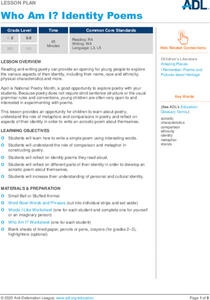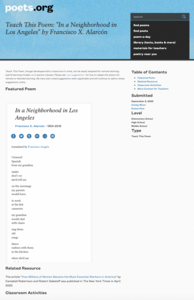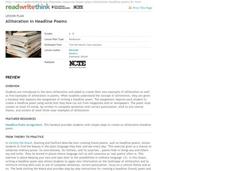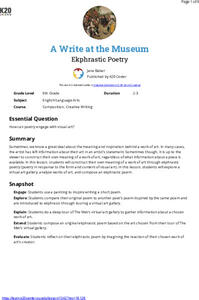Anti-Defamation League
Who Am I? Identity Poems
A lesson celebrating identity begins with a something-about-me activity, then moves on to writing favorite words. Class members then brainstorm metaphors and comparisons and read a poem to inspire their poetic abilities. Scholars craft...
Scholastic
Writing An Acrostic
Invite learners to introduce themselves through poetry. After brainstorming and choosing details, pupils draft two acrostic poems using their names as the base. They then evaluate and revise their poems.
Poetry4kids
Onomatopoeia Poetry Lesson Plan
Two exercises boost scholars' knowledge of a onomatopoeia with excerpts from famous poems. In exercise one, participants circle onomatopoeia words. Exercise two challenges writers to choose three words to use in an original poem.
Poetry4kids
Personification Poetry Lesson Plan
Scholars take part in two exercises to boost their knowledge of personification. After reading a detailed description and excerpts from famous poems, writers list action verbs and objects then combine words to create a humorous...
Academy of American Poets
Teach This Poem: "In a Neighborhood in Los Angeles" by Francisco X. Alarcón
After sketching an essential person and reading an article, scholars read the poem "In a Neighborhood in Los Angeles" by Francisco X. Alarcón. They listen to the poem in English and Spanish and record lines that stand out to them. Small...
Academy of American Poets
Teach This Poem: "Violin" by Nikki Wallschlaeger
Nikki Wallschlaeger's Violin is the featured poem in a lesson that uses music and multiple readings to delve deep into its analysis. After a writing warm-up, learners watch and listen to a video that showcases Regina Carter Quintet's...
Wadsworth Atheneum Museum of Art
Where I'm From: Symbolism in Paint and Poetry
After a review of symbolism, class members use the provided worksheet to first list the objects they observe in Arnold Mesches' painting "Coney Island" and then suggest possible symbolic meanings for each of the objects. A second...
ReadWriteThink
Alliteration in Headline Poems
Poetry is everywhere you look! Create found poems using headlines from newspapers and magazines. Young poetry focus on creating alliterative phrases with words they find in headlines, tying their poems to a central theme.
Geography 360°
Poetry Writing
Put the tips and tricks in this guide into practice in order to encourage your pupils to blossom into poets. A wonderful reference material for teachers, this packet includes definitions of poetic terms and forms as well as step-by-step...
Curated OER
What Is Poetry?
The first lesson of 12 in a poetry unit asks class members to develop their own definition of poetry. After crafting a response, they examine a variety of examples and decide if the resources are or are not poems.
Angel Island Immigration Station Foundation
Making Your Mark: Free Verse Poetry
Using the insight they have gained into the experiences of detainees at the Angel Island Immigration Station, young poets create their own free verse poems that they feel captures what it may have felt like to be an immigrant interned on...
EngageNY
End of Unit Assessment: Writing Best First Draft of “Back Again” Poem
Team up! Scholars begin working with their research teams to review the components of an effective poem. They then move on to independent work by beginning the end-of-unit assessment. Writers complete the draft of their "Back Again"...
K20 LEARN
A Write At The Museum: Ekphrastic Poetry
Which came first—the painting or the poem? For this case, it is the painting. Scholars closely examine a work of art and then craft an ekphrastic poem in response. A carefully scaffolded nine-page plan leads young poets through the process.
Read Write Think
Poetry Portfolios: Using Poetry to Teach Reading
Over the course of five periods, scholars create a poetry portfolio. They begin with a reading of the poem, Firefly. With a focus on vocabulary, learners reread the poem then look for sight words and other skills.
Hong Kong Special Administrative Region
Learning English through Poems and Songs
Exposing learners to the power of words in poetry is a stimulating way to learn languages. Songs, haikus, rhyming words, and narrative works are all employed in a resource for teaching English as a Second Language.
National Council of Teachers of English
A Bear of a Poem: Composing and Performing Found Poetry
Scholars work collaboratively to compose a found poem from one of their favorite stories. With a finished product in hand, class members form a circle and perform their work for an audience by taking turns reciting one line till the poem...
National Council of Teachers of English
Writing Acrostic Poems with Thematically Related Texts in the Content Areas
Scholars scour thematically aligned texts to gather a bank of words they can use in an original acrostic poem.
National Council of Teachers of English
Writing Poetry with Rebus and Rhyme
Young scholars write rhyming poems using rebus. With pictures instead of words, authors create original work about things they love.
ReadWriteThink
What is Poetry? Contrasting Poetry and Prose
Introduce middle schoolers to the different strategies used when reading prose versus poetry. Groups use a Venn diagram and a poetry analysis handout to compare the characteristics of an informational text and a poem on the same subject...
Academy of American Poets
Teach This Poem: "The Teller of Tales" by Gabriela Mistral
The poem "The Teller of Tales" by Gabriela Mistral is the subject of a thoughtful lesson that allows scholars to listen to or read the poem, then discuss its meaning.
National History Day
Poetry from the Trenches of World War I
Often, the real-life experiences of soldiers gets lost back home when the war seems so far away. Scholars investigate the personal side of World War I in the trenches of Europe to complete a collaborative social studies activity. When...
Curated OER
Maniac Magee: Found Poem
Instruct your readers to scrounge through the pages of Maniac Magee in search for descriptive passages or words they may use to write poetry. As they look for meaningful, sensory descriptors in Jerry Spinelli's novel, readers connect to...
Curated OER
The Pearl: Found Poem
It's hard to beat the beauty of John Steinbeck's prose, so borrow a little of it to form your own found poetry. After kids finish Chapter One of The Pearl, they select the most evocative and vivid words to create found poems.
Curated OER
Short Poems Are Scary!
What do all those chairs and pencils do in the classroom once everyone leaves? Allow imaginations to run wild with frighteningly short poems!
Other popular searches
- Acrostic Poems
- Shape Poems
- Rhyming Poems
- Acrostic
- Examples of Diamante Poems
- Color Poems
- Onomatopoeia Poems
- Christmas Tree Shape Poem
- Adjective Words in Poem
- Diamante Poems
- Onomatopoeia Poems Examples
- Concrete Poems

























